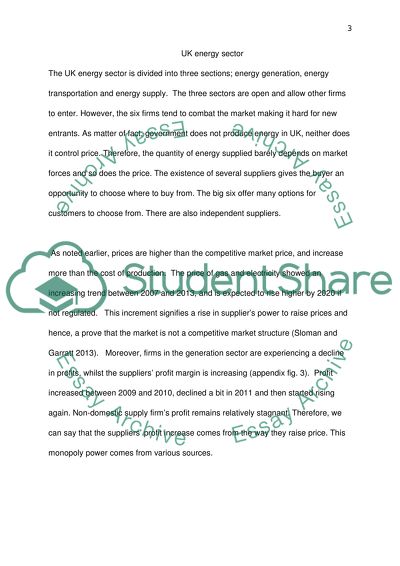Cite this document
(“Discuss the findings of the OFGEM report with regards to the UK energy Coursework”, n.d.)
Discuss the findings of the OFGEM report with regards to the UK energy Coursework. Retrieved from https://studentshare.org/macro-microeconomics/1676424-discuss-the-findings-of-the-ofgem-report-with-regards-to-the-uk-energy-market-and-discuss-if-more-competition-between-the-big-six-uk-energy-firms-may-benefit-uk-consumers
Discuss the findings of the OFGEM report with regards to the UK energy Coursework. Retrieved from https://studentshare.org/macro-microeconomics/1676424-discuss-the-findings-of-the-ofgem-report-with-regards-to-the-uk-energy-market-and-discuss-if-more-competition-between-the-big-six-uk-energy-firms-may-benefit-uk-consumers
(Discuss the Findings of the OFGEM Report With Regards to the UK Energy Coursework)
Discuss the Findings of the OFGEM Report With Regards to the UK Energy Coursework. https://studentshare.org/macro-microeconomics/1676424-discuss-the-findings-of-the-ofgem-report-with-regards-to-the-uk-energy-market-and-discuss-if-more-competition-between-the-big-six-uk-energy-firms-may-benefit-uk-consumers.
Discuss the Findings of the OFGEM Report With Regards to the UK Energy Coursework. https://studentshare.org/macro-microeconomics/1676424-discuss-the-findings-of-the-ofgem-report-with-regards-to-the-uk-energy-market-and-discuss-if-more-competition-between-the-big-six-uk-energy-firms-may-benefit-uk-consumers.
“Discuss the Findings of the OFGEM Report With Regards to the UK Energy Coursework”, n.d. https://studentshare.org/macro-microeconomics/1676424-discuss-the-findings-of-the-ofgem-report-with-regards-to-the-uk-energy-market-and-discuss-if-more-competition-between-the-big-six-uk-energy-firms-may-benefit-uk-consumers.


